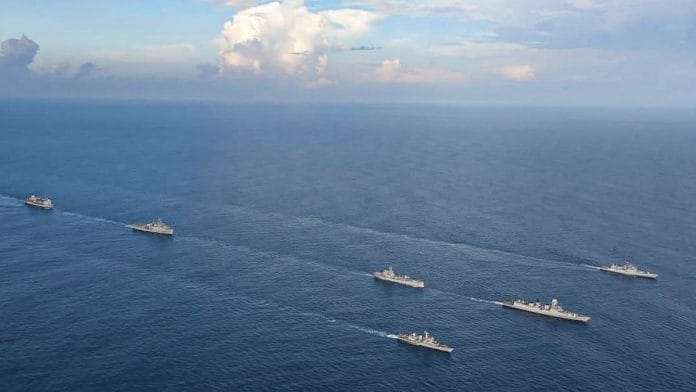
Thank you dear subscribers, we are overwhelmed with your response.
Your Turn is a unique section from ThePrint featuring points of view from its subscribers. If you are a subscriber, have a point of view, please send it to us. If not, do subscribe here: https://theprint.in/subscribe/
Maritime trade warfare, also known as “commerce warfare,” is an ancient military strategy that dates back to ancient Greek history. It has been employed in various forms for thousands of years. In earlier times, maritime trade warfare was used to disrupt an enemy’s economy by attacking or neutralizing their commercial shipping. This was achieved through blockades of enemy ports or by the destruction of an enemy’s port infrastructure.
In the twentieth century, new technologies such as torpedoes, submarines, and airplanes allowed for blockades to be conducted from greater distances, far away from an enemy’s coast. During World War I, Germany’s practice of sinking neutral vessels without warning eventually drew the United States into the war on the side of the Allies. In World War II, the United States employed a successful campaign of maritime trade warfare against Japan, resulting in the destruction of 8.1 million tons of Japanese merchant shipping.
The Merchant Navy played a critical role during the Battle of Britain by supporting the Royal Air Force (RAF). Despite facing constant danger from German U-boats and bombers, the Merchant Navy transported vital supplies, such as ammunition, fuel, and food to Britain. It was also instrumental in the evacuation of troops during the Dunkirk evacuation. Without its contributions, the RAF would have been unable to defend Britain against Germany.
In summary, maritime trade warfare is an ancient military strategy that has been used throughout history to disrupt an enemy’s economy and military supply chain. The Merchant Navy played a crucial role in supporting the RAF during the Battle of Britain and has been vital in transporting supplies and personnel during times of war.
Maritime trade war is practiced even today, but differently. India has seen maritime war being inflicted on it through the path of influencing policy. India’s maritime policy, or rather the absence of it, has impacted investment and creation of a healthy merchant marine fleet, seems to suggest that the targeting by lobby groups of foreign shipping companies has been effective. India, after more than 60 years has no Maritime Policy and its merchant fleet is just about 0.8% of world fleet.
India is poised to become a “manufacturing” hub and export to the world. This would presuppose easier access to export markets and for our strategic imports – crude oil, LPG, Fertilizer etc. All these supply lines are today hostage to ships controlled by foreign entities who carry close to 92% of India’s EXIM cargo.
The Indian EXIM trade pays a heavy price for this warfare. In the past two years, Indian EXIM traders found themselves at the short end of the stick which was wielded by foreign container shipping companies. Freight rates ballooned by as much as 10 times and lack of space on container ships. As per the Economic Survey of India 21-22, transportation costs escalated, resulting in increase in transport payments to foreign companies by 64.9 per cent on y-o-y basis to US$ 14.8 billion. No Indian shipping company could assist India’s EXIM cargo thanks to our own policies which disincentivise owning of container fleet in India. The Russia-Ukraine war has created huge uncertainties for transportation of Crude Oil that India so badly needs.
On 28th February 2023 it was reported that the scheme for the demerger of SCI has paved the way for the government to divest its holding in the Shipping Corporation of India as it should.
However, on the backdrop of all of this, India needs to be mindful of the need to mitigate risks, protect its supply lines and its strategic interests in the subcontinent. As India struggles on the path to becoming Atmanirbhar and a manufacturing hub of the world, the challenges to garner, procure and transport resources will intensify, and it would likely lead to perhaps stiffer geo-political conflicts. At that juncture, India would find itself woefully unprepared if it does not have a strong and large Indian flag fleet.
Therefore, India’s longer term economic as well as strategic interests would be well served by ensuring that post-divestment the SCI fleet continues under the Indian flag and does not get diverted to some other flag. Not doing so, will lead to a severe diminution of India’s merchant marine fleet (SCI’s share in Indian fleet is about 30%) and increase the dependence of India on foreign shipping companies to carry necessary and critical cargoes.
The next step would be to formulate policies that promote investment in Indian merchant marine fleet. Any dreams of chasing a respectable GDP growth will be brought to nought if we do not prepare to control our supply lines across the seas.
Anil Devli
07th March 2023
(Views are personal and do not reflect those who I work for.)
These pieces are being published as they have been received – they have not been edited/fact-checked by ThePrint.


COMMENTS